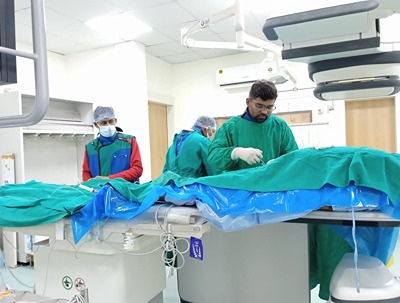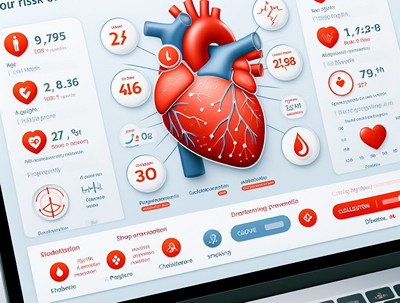Chest pain is one of the most common reasons for seeking care in the emergency department. It is a symptom that can arise from various causes, ranging from harmless muscle strains to life-threatening heart conditions. Of all hospital visits for chest pain, after diagnostic evaluation, only 10% to 15% of patients actually have heart issues. As a cardiologist, it's crucial to raise awareness among the general public about the importance of evaluating chest pain promptly. This article aims to provide insights into chest pain, its potential causes, and steps to assess and address it.
Anatomy of Chest Pain:
The chest is a complex area, and pain can originate from different structures such as the heart, lungs, muscles, ribs, or even the digestive system. Understanding the nature of chest pain is vital for proper evaluation.
Cardiac vs. Non-Cardiac Chest Pain:
-
Cardiac Chest Pain:
- Typically described as pressure, squeezing, heaviness, or tightness.
- Often radiates to the left arm, shoulder, jaw, or back.
- Accompanied by shortness of breath, sweating, and nausea in some cases.
- Typically builds in intensity over a period of a few minutes.
- May begin with physical / emotional stress
-
Non-Cardiac Chest Pain:
- Can be sharp, stabbing, or aching.
- May worsen with movement or deep breaths.
- Often related to muscle or skeletal issues.
- Pain that may be localized by the tip of one finger.
- Constant pain that persists for many hours.
- Very brief episodes of pain that last a few seconds or less.
- Pain that radiates into the lower extremities.
However one should always remember that there can be overlapping of such features of chest pain and consultation must be done with professional before making a self-diagnosis.
Potential Causes of Chest Pain:
-
Cardiac Causes:
- Angina: Reduced blood flow to the heart muscle.
- Heart Attack: Complete blockage of a coronary artery.
- Pericarditis: Inflammation of the membrane around the heart.
- Heart Valve issues: Leakage or stenosis of heart valves leading to increased pressures.
-
Non-Cardiac Causes:
- Muscle Strain: Overexertion or trauma to chest muscles.
- Gastrointestinal Issues: Acid reflux, gallbladder problems.
- Pulmonary Causes: Pneumonia, pulmonary embolism.
Who are at risk:
- People with history of Diabetes, Hypertension, prior heart disease or stroke.
- People with family history of Ischmeic heart disease, Diabetes, Hypertension, Lipid disorders.
- Overweight or Obese
- Smokers and Drug addicts
- Stress
- Risk increases with age.
Evaluation of Chest Pain:
-
Recognize Emergency Signs:
- If chest pain is severe, lasts more than a few minutes, or is accompanied by shortness of breath, severe sweating, dizziness or feeling of impending doom call emergency services immediately.
-
Consult a Cardiologist:
- Seek medical attention for any unexplained or persistent chest pain.
- Provide detailed information about the pain's nature, duration, and any associated symptoms.
- Give information about any existing diseases, family history or any medications you are taking.
-
Diagnostic Tests:
- Electrocardiogram (ECG/EKG): Records the heart's electrical activity.
- Blood Tests: Check for cardiac enzymes if indicated. Other blood tests such as RBS, HBA1C, Lipid profile can be done to assess risk profile.
- Imaging: Echocardiograhy
- Stress test: Done in stable patients without acute coronary syndromes (Heart attack) to evaluate chest pain and for risk stratification
- Angiography: Your cardiologist will decide whether invasive coronary angiography or CT coronary angiography is needed or not.
Preventive Measures:
-
Healthy Lifestyle:
- Adopt a heart-healthy diet rich in fruits, vegetables, and lean proteins. Avoid food rich in saturated fats, salt & sugar.
- Engage in regular physical activity to maintain cardiovascular health.
- Have enough sleep and avoid stress.
- Quit smoking, Avoid alcohol.
-
Regular Health Check-ups:
- Periodic check-ups help monitor risk factors and detect issues early. Consult your Cardiologist.
-
Know Your Body:
- Be aware of your body and any changes in your health. Report unusual symptoms promptly.
Conclusion:
Chest pain is a symptom that demands attention and prompt evaluation. While not all chest pain is related to the heart, it is essential to err on the side of caution. Timely assessment and awareness of risk factors can contribute significantly in preventing and managing cardiac issues. If in doubt, always consult a Cardiologist.
Remember, this article is intended for informational purposes only and is not a substitute for professional medical advice. If you experience chest pain or any concerning symptoms, consult with your Cardiologist. Your health is your greatest asset—take care of it!




